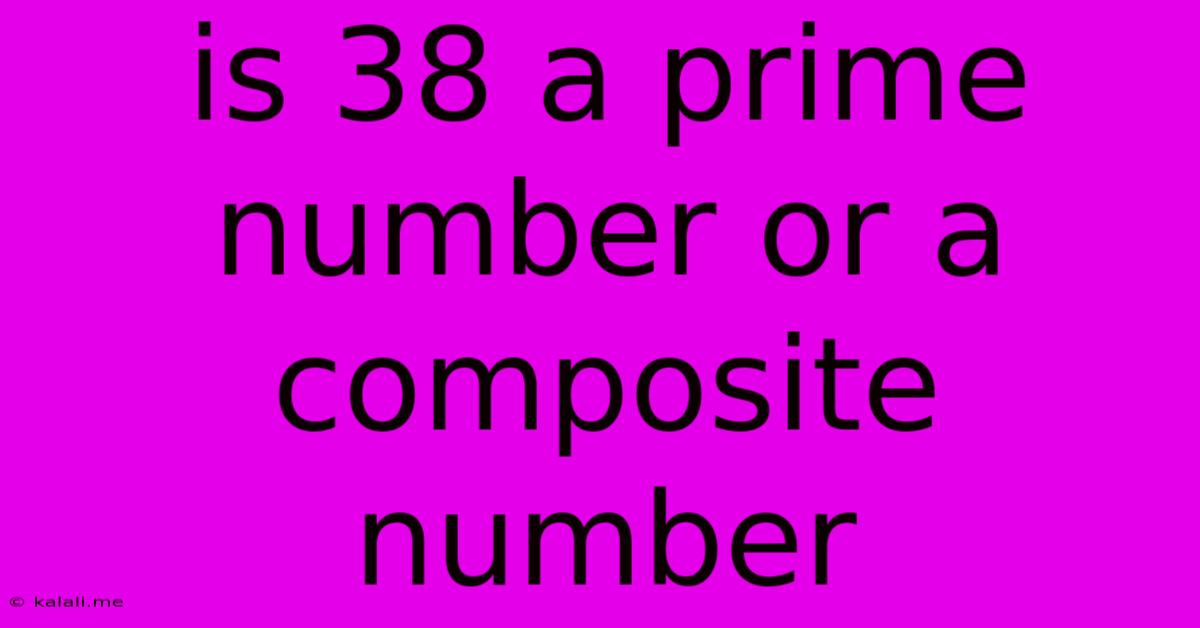Is 38 A Prime Number Or A Composite Number
Kalali
May 09, 2025 · 2 min read

Table of Contents
Is 38 a Prime Number or a Composite Number? A Complete Explanation
Is 38 prime or composite? This seemingly simple question touches on fundamental concepts in number theory. This article will not only answer that question definitively but also delve into the definitions of prime and composite numbers, providing you with a clear understanding of how to identify them.
What are Prime and Composite Numbers?
Before we determine whether 38 is prime or composite, let's establish the definitions:
-
Prime Number: A prime number is a whole number greater than 1 that has only two divisors: 1 and itself. This means it's not divisible by any other whole number without leaving a remainder. Examples include 2, 3, 5, 7, 11, and so on.
-
Composite Number: A composite number is a whole number greater than 1 that has more than two divisors. In other words, it's divisible by at least one number other than 1 and itself. Examples include 4, 6, 8, 9, 10, and many more.
The Number 38: Prime or Composite?
Now, let's examine the number 38. To determine if it's prime or composite, we need to find its divisors. We can start by checking for divisibility by small prime numbers:
- Is 38 divisible by 2? Yes, 38 divided by 2 equals 19.
Because 38 is divisible by 2 (and 19), it has more than two divisors (1, 2, 19, and 38). Therefore, 38 is a composite number.
Identifying Prime and Composite Numbers: Practical Tips
Determining whether a larger number is prime or composite can be more challenging. Here are some helpful strategies:
-
Check for Divisibility by Small Prime Numbers: Start by checking divisibility by 2, 3, 5, 7, 11, and so on. If you find a divisor other than 1 and the number itself, it's composite.
-
Use the Sieve of Eratosthenes: This is a method for finding all prime numbers up to a specified integer. It's particularly useful for finding primes within a range.
-
Factorization: Breaking down a number into its prime factors can definitively determine if it's composite. If it has prime factors other than itself and 1, it's composite.
Conclusion:
In summary, 38 is a composite number because it's divisible by 2 and 19, in addition to 1 and itself. Understanding the definitions of prime and composite numbers and employing efficient identification methods is crucial in various mathematical applications and problem-solving scenarios. This article provided a clear explanation and practical tips to help you distinguish between these fundamental number types. Remember to practice to build your proficiency in identifying prime and composite numbers.
Latest Posts
Latest Posts
-
11 Over 5 As A Mixed Number
May 09, 2025
-
A Rectangular Prism Has How Many Edges
May 09, 2025
-
90 Is What Percent Of 60
May 09, 2025
-
Which Algebraic Expressions Are Polynomials Check All That Apply
May 09, 2025
-
What Percent Of 75 Is 90
May 09, 2025
Related Post
Thank you for visiting our website which covers about Is 38 A Prime Number Or A Composite Number . We hope the information provided has been useful to you. Feel free to contact us if you have any questions or need further assistance. See you next time and don't miss to bookmark.